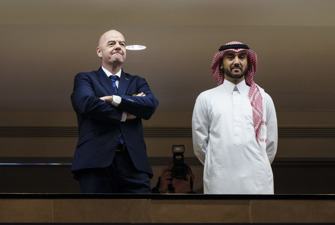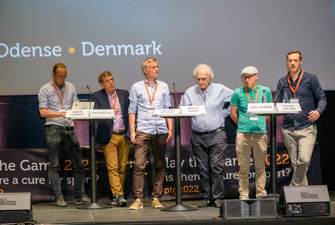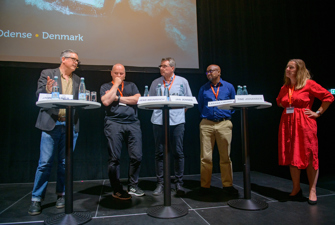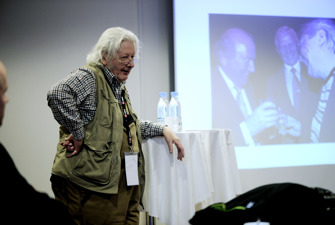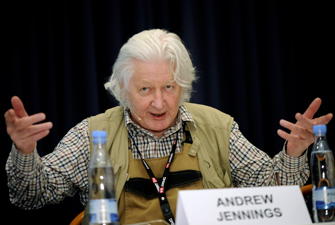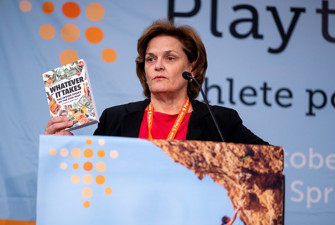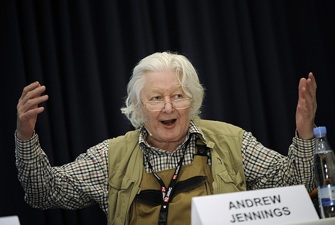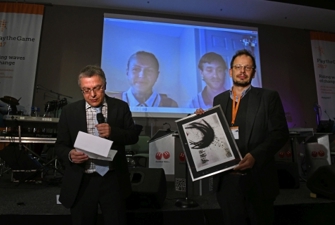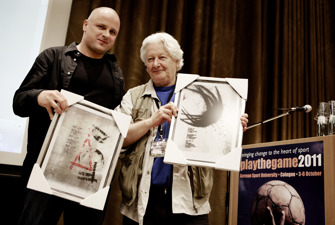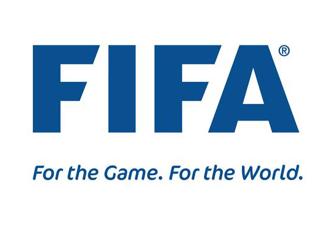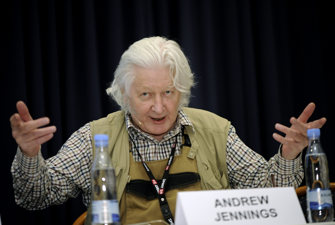Media Power and Responsibility in Sport and Globalisation
In this talk to an international sports media conference in Copenhagen, Robert Davies makes the case for social responsibility in the media.
The sports and sporting goods industries have grown to become immensely influential and rich and one of the world largest industries. The power of sport for development, conflict prevention and good health is also a major force. Media companies and journalists have a central role to play as a pillar of democratic market economies. They face higher expectations for ethical and responsible practices as an influential part of the global business community which is not exempt from distrust and pressures for greater transparency.
Robert Davies outlines a range of measures that a responsible media company can take to maintain standards and be a force for good development, and outlines how affordable access to low cost technologies have introduced a new countervailing force for democracy and activism.
Sport and the Media must surely be the most potent combination of forces amongst the key actors in the globalisation game. They have a unique synergy sport as the premier global media content, and media as the premier partner for sport and sports industries. A result of this alliance applied to the worlds most attractive activity is immense audiences, immense economic influence and power, and immense reach into countries and communities. If conducted openly, responsibly and in the public good it also brings immense potential for helping create in the long-term a more healthy, understanding, inclusive and stable world.
But the commercial world of media and sport is full of IFS. I would like to reflect on how sport has risen to become one of the worlds leading and most powerful industries. What are the implications for society which is increasingly concerned with corporate social responsibility and corporate citizenship? What is the role of the professional journalist on the front line of these immense commercial empires inter-facing with politics, powerful stars and brands? And how could the media be a force for good in sports development in a troubled world of increasing risk youth unemployment and conflict?
I speak from the perspective of having worked for over a decade with international and multinational companies, including some of the largest media companies, sports sponsors and some sporting goods producers, promoting corporate citizenship, the engagement of business in bringing solutions to social problems through partnerships for development in over 50 countries around the world.
There has seldom been a time when global risks and dangers have been accompanied by so many opportunities. Sports industries, and all associated with them the professional and amateur clubs and athletes, the sporting goods industries, and the massive ancillary world of travel, communications and sports sponsors have an enormous and positive potential role to play in many of the key issues of engagement, reduction of corruption, conflict and sustainability that we face in the world today.
Firstly, how has sport risen to become one of the worlds leading and most powerful industries?
There is in my view too little recognition of how the business of sport, at community, national and international level, both recreational and professional, can be a positive force for good health, peace, development and ethics in a world that is hungry for values. Even those in the sports industries may not yet, in my view, have come to terms with the influence they now have, and can have, due to the emergence of globalisation and the many threats and challenges which now arise.
Sport plays a unique part in our lives. After work itself it is the largest focus of mass civil participation. It has more voluntary community level leaders and teachers than any other human activity including religion. Together with related services it is the largest employer. It attracts the largest audiences of any activity on the planet. It consistently fills more pages in more newspapers, uniquely transcending geography, politics, class, race, sex, culture and religion.
It has many of the best-known and most potent global brands in sporting goods, sports teams and associated sponsors. It is populated by the best known celebrity personalities. It is the subject of the worlds highest value TV and communications deals, and the highest priced advertising slots the TV rights to the last Soccer World Cup and Olympic Games combined were reported as being over $2.3 billion (thats 40 cents for everyone on the planet). It can also be a trigger for urban development through regeneration lead by sports developments as we have seen in many inner city areas.
Sport business is also very big. The sporting goods industries alone are estimated to have an annual retail market possibly of over $600 billion, linked to a global network of small and big businesses, focussed primarily on the 16 to 25 age group - which is more than the GDP of many countries. This doesnt count in media revenues and sponsorship, travel and tourism, infrastructure, associated food and beverages, gambling, corporate entertaining, and millions from sports club and entrance fees. European soccer leagues alone are said to be a $10 billion market. Like few other industries, it has from the start exploited the potential of globalisation, and has been at the forefront of internationalisation for almost a century. And yet, uniquely, and with the exception of activist campaigns against some branded goods, it has escaped the storm of public protest now associated with almost all other aspects of globalisation.
Sport also has a major role to play in the world due to critical problems of health and increasing rates of non-communicable disease linked to diet and lack of physical activity which according to the WHO is fast becoming the main health danger worldwide. It also has a critical part to play in conflict prevention and in economic development, particularly amongst young people.
It is not surprising that sport, in spite of much publicised soccer hooliganism, has been a medium for vital and pioneering peaceful contact between East and West, Hindu and Muslim, across the religious divides in Northern Ireland or heralding in ping-pong matches the opening of China in the late 1960s. It has suspended conflict in the no-mans-land between the First World War trenches, refugee camps in the Balkans, between Capitalism and Communism during the Cold War, between the North and South Koreas of today and no doubt, if politicians made way to more willing human spirits, in the Middle East tomorrow.
Sport can underpin and celebrate diversity. A common language we have with the people of Israel, Palestine, Jordan and Iraq is the language of soccer! Sport is a powerful neutraliser with an accepted global language and global rules. It can be an important twin track in global diplomacy
Sport must be a critical potential component of development in a world where some three billion people live on less than $2 a day, or amongst the unemployed on our own door-steps. Helping build communities, develop young people, reduce risks of conflict, and contribute to good health are critical building blocks of development.
Sport and its values of fitness, fair play and participation has a unique part to play in a troubled world. The shocking events of doping scandals, Olympic bribery and corruption, of the past year since the 11th September, and also the crisis of confidence caused by corporate governance scandals, have all brought home to us all how fragile, small and vulnerable our inter-connected world is and how important trust is. Also how these far off global issues are now on our doorstep, and how according to reliable attitude surveys our stakeholders consumers, investors, employees, regulators, media and the public in general are wanting values based leadership.
Secondly, why should social responsibility be of concern to the Media? And what is the role of the professional journalist on the front line of these immense commercial empires inter-facing with politics, powerful stars and brands?
The media has a uniquely important part to play in functioning democracy and open market economies as a vital check and balance on abuse of political and economic power. Journalists themselves, who protect their editorial freedom fiercely, at least in many countries, are rightly proud and protective of their professional ethics. But then it gets complicated.
I think it is necessary to distinguish here between journalists and media companies they work for, who have different interests and are subject to other forces. It is also necessary to recognize there are questions of content that sometimes create tensions through the need to sell copy, sell newspapers, attract viewers and command advertising on the one hand and the duty to explain, analyse, reveal and respect on the other.
The survey conducted by MandagMorgan Industry or Independence ?: survey of the Scandinavian sports press confirms a trend that others have observed in the media around the world of almost a race to the bottom in terms of superficial content in sports coverage focusing on personalities, events and gossip rather than much if any serious content, and almost nothing on the political, economic and social aspects of sport. Commenting on the lack of critical enquiry into sports affairs a media analyst from the Research Institute for Sport, Culture and Civil Society describes how "a kind of holy trinity exists between media, the professional sports clubs and money interests".
All too often media companies claim editorial freedom when questioned on lack of inquiry by their papers or broadcasting stations into sensitive areas, or lack of interest in low quality standards. It seems to many extraordinary that commercial advertisers are subjected to more rigorous standards of decency and honesty in most countries, and subject to greater scrutiny, yet the tabloid text alongside the advert may carry innuendo, half-truth and misrepresentation defended as editorial freedom.
Some journalists attempting to cover broader issues of sport, including doping and bribery scandals, economic interests and corruption in the sports world have faced ridicule, intimidation, censorship and dismissal before their stories proved sound.
Media and communications companies are part of the mainstream international commercial business community. This past decade has seen the issues of corporate social responsibility move increasingly rapidly from the fringe of management practice of a few pioneers, some of them in your industries, to a major issue for the Boardroom agenda. In the process it has attracted increasing attention and widespread public interest, and is now seen by many institutions, from the United Nations, World Bank, European Union, and OECD down, as a key part of the solution to pressing governance and development challenges.
The media has played key roles in exposing bad ethical practice, scandals, vested interests and double standards whether in business or in personalities. But the media often faces criticisms of putting events, personalities, entertainment, gossip and sensationalism I guess what makes the news ahead of the need to explain context, take a more analytical view and look at issues in the longer-term way that solutions to complex issues and progress require.
Then there is the problem of patronage and marketing deals for exclusive rights, often overpriced as we have recently seen in the cases of collapsed European media organizations, to compliant bidders in a sellers market. The media as commercial organizations, and organizations prosper on access to critical events and stars whether valuable World Cup rights, access to lucrative Chinese markets, access to exclusive Presidential and Prime Ministerial press briefings or ringside seats in the amphitheatres of War. They also recognize where their interests lie in avoiding provocative action that may make them vulnerable to being excluded from access to a deal or privileged briefing opportunity, even if temporarily, and thus loose competitive advantage to other media companies. By and large media companies as businesses are cautious, show risk adverse behavior and have a herd instinct.
In spite of its critical role as a pillar or democracy, trust in the media is not that high, and generally lower than trust in the armed forces, NGOs and Government. A recent survey by Gallup International and Environics International for the World Economic Forum the Voice of the People Survey (July-September 2002) of 36,000 people across 47 countries - suggests that trust has fallen to critical proportions. Overall some 69% put some or a lot of trust in the armed forces compared with 26% who put little or no trust. NGOs score 59% trust, the UN 52%, religious institutions and the police each score 57%. Government scores 50% and press and the media 49%, with 47% showing little or no trust in the media. The legal system, global and national companies and Parliaments were the only institutions scoring lower on little or no trust compared to the media. In North America and Europe the media was consistently trusted less then Governments, except where it was more trusted in Asia, Latin America, Africa and the Middle East.
Put simply, Corporate Social Responsibility is the framework for the role of business in society - it is the set of standards of behaviour to which a company subscribes in order to make its impact on society positive and productive. The production and selling of goods and services, business ethics, environmental practices, recruitment and employment conditions, approach to human rights and investment in the community are examples of such impact. Globally the media is dominated by some 10 companies and 50 sub-regional companies. The case for corporate responsibility in the media rests on the facts that:
- Most media companies are themselves commercial enterprises and cannot exempt themselves from these pressures and expectations
- The media who often report on bad business practices and harmful impacts of companies should themselves ensure their practices are sound the fact that they communicate about others doesnt exempt them from communicating about their social impacts
- It is necessary as the survey findings suggest to establish and maintain trust to the benefit of their audiences, employees, advertisers
- The particular power of the media places a higher onus on being legal, decent and honest which are essential tenets for media companies
- In some cases the cross ownership and media concentration creates near monopolies that must be addressed by the encouragement of pluralism for public good
- Finally, on an aspirational basis, many issues troubling the world can be improved with the positive support of the media whether initiatives to secure press freedom, exposure of censorship, training in responsible journalism in newly democratizing states and the learning power of media.
The sports media and sports journalists have a key role to play due to the influence of sport in the world, its power for carrying messages about people, countries and behaviour, and the importance of fairplay.
Finally, how could the media be a force for good in sports development in a troubled world of increasing risk and conflict? And what would a socially responsible media company look like?
Media companies themselves could adopt corporate social responsibility charters based for example on the CEO Charter for Global Corporate Citizenship which the IBLF produced with the World Economic Forum in January 2002 focusing on the CEO leadership role and the environmental, people, governance and developmental dimensions of business practice. They should adopt the UN Global Compact.
Media companies could undertake social reporting which is after all what the FTSE4Good and Dow Jones Sustainability indexes suggest is good practice in transparency those rating media companies in this area have recently pointed to Bertelsmann, Axel Springer Verlag being leaders in self-reporting, and Pearson Group and AOL Time Warner rising. The Pearson Group owned Financial Times is undoubtedly a leader in serious corporate social responsibility reporting. Reuters have an exceptional track record in comment to training of journalists. The BBC World Service is outstanding in much of its coverage and diversity of reporters.
Conflicts of interest where journalistic standards may be surrendered for access to countries, events and personalities and influence of vested interests must be kept in check and pressures resisted and honestly debated. Where countries can play one media company off against another there is a case for a more collective approach amongst competitors to threats to media independence.
Clearly, and while it is both controversial and possibly a matter of opinion to suggest, responsible media companies will strive for accuracy and fairness and to balance news with analysis, promote access and pluralism and ensure adequate redress for justified complaints. They should not shy from investigating and exposing corruption.
The responsible media company will play its part in promoting access to wider and minority issues and opinions, and also play a role particularly in developing markets and countries, in helping train journalists, advise them on tackling matters of personal safety, and develop media skills and emerging industries.
Similarly responsible media companies will engage in communities, and also reflect in employment and engagement the diversity of the communities they cover.
In sport and the massive resources devoted to sports coverage there is a strong case for ensuring that the many development aspects of sport that exist whether health, education, conflict prevention and address of disadvantage - get some attention and promotion, and that the ethics of sport are strengthened.
One of the exciting developments is the nature of change of the electronic media and ICT industries over the past few years and the undreamed of opportunities for affordable access to low cost technologies and the Internet that has given most ordinary citizens opportunities for new forms of media. It has also put power digital technologies into the hands of activist groups who have themselves become part of the check and balance originally reserved for the media. This provides a countervailing source of influence to the traditional media and raises new challenges about editorial freedom and responsibility. It has become one of the major drivers in the pressure for social responsibility in business and in sport and other areas of life.
It is this new dimension in politics and mass communication, particularly among the young, which will start to dictate new terms for the engagement of major sports sponsors in controversial areas such as countries with questionable human rights records, not least China in the run up to the 2008 Beijing Olympics. And as 2008 nears all those involved, not least the sporting goods industry and major Olympic sponsors will find that the pressures to address key areas of social sustainability will follow such as human rights in the areas of labour standards and broader issues of religious freedom amongst Turkic Muslims in Xinjiang, Tibetans and other groups.
This is not meant as a criticism, but is an observation on an inescapable issue which will surely engage us all in a dialogue - a US Congressional Committee, lobby groups and activist campaigns in Europe and America are already turning their attention to this, including a US shareholder activist campaign gathering momentum in promoting resolutions at company AGMs on the so called China Business Principles. Understandably, high profile global sporting events are seen as a frontier for raising issues of injustice and social responsibility they always have been. The death of a woman campaigning for womens right to vote in England, by throwing herself under a racehorse, is a poignant reminder of the use of sport as a medium for protest. But the power of the Internet and the text message makes it all the easier to mobilise campaigns and public opinion these days. It is important the media understand the issues at stake.
The alliance of sport and media is an amazing force for civic participation, entertainment, excitement, global harmony and development; for celebrating human achievement, diversity and excellence at its best. But globalisation has changed the nature of power and responsibility and the media and journalists are on the front line.
Credits: This talk draws on material from a speech I made at the World Sports Forum, "Sport, Citizenship and Development - challenges and opportunities for sports sponsors, Lausanne, 23 September, 2002. I also acknowledge material from Gallup International/Environics International Voice of the People Survey for the World Economic Forum , November 2002; MandagMorgan Industry or Independence?: survey of the Scandinavian sports press; World Health Organization; Report by Sustainability, Ketchum and UNEP, Good News & Bad: The Media, Corporate Social Responsibility and Sustainable Development, 2002; International Federation of Journalists; Edelman PR Worldwide reports; World Economic Forum/IBLF Global Corporate Citizenship: the Leadership Challenge for CEOs and Boards, January 2002.



